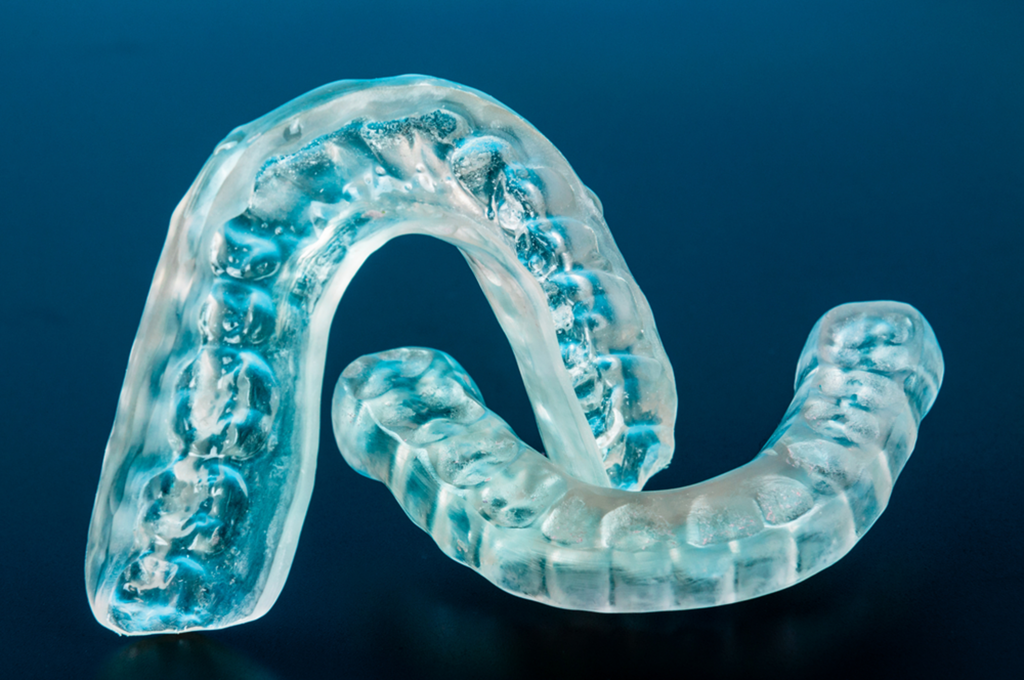Do you grind and clench your teeth while you sleep? Do you stop breathing while you sleep, waking up suddenly with a snort or a gasp? If you experience either of these phenomena, you may have sleep bruxism or obstructive sleep apnea. Sleep bruxism and obstructive sleep apnea are two medical conditions that should be investigated and diagnosed by a physician. But our dentist in Edmonton should be involved, too. Why?
A custom-fitted mouth guard designed and provided by our dental specialist near you may solve your sleep bruxism and obstructive sleep apnea.
What is Sleep Bruxism?
Sleep bruxism is a common condition characterized by clenching your teeth and jaw and grinding your teeth. Bruxism can be caused by various factors, including stress and obstructive sleep apnea. Some studies have shown that up to 30% of children experience sleep bruxism, compared to eight percent of adults.
You may discover that you have sleep bruxism only by noticing the constellation of symptoms it produces. People with sleep bruxism can have dental symptoms that include tooth sensitivity, tooth pain, loose teeth, chipped teeth, worn tooth enamel, flattened teeth, and damaged dental work. These are symptoms that, if explained to or observed by our dentist, they identify as associated with sleep bruxism.
There are non-dental symptoms of sleep bruxism, as well:
- Pain in the neck, face, and jawTemple-focused headaches akin to an earach
- Difficulty in completely opening and closing your jaw
- Fatigue
- Even signs of having chewed the inside of your cheek
- If you get a mouth guard in Edmonton, it can help with your sleep bruxism
Dentists in Edmonton with training in sleep medicine can create a custom-fitted mouth guard from acrylic by taking moulds of your teeth and sending them to a dental lab. The mouth guard will look and act like an orthodontic retainer and cover the top and bottom teeth. It helps address your sleep bruxism by physically preventing you from grinding your teeth together.
What is Obstructive Sleep Apnea?
Our dentist who notices signs of sleep bruxism will also investigate whether your grinding and clenching are symptoms of obstructive sleep apnea. Roughly one-quarter of patients with sleep bruxism also have obstructive sleep apnea.
Obstructive sleep apnea is characterized by throat muscles that relax more than they should, preventing air from flowing through the airway properly. A sleeper whose airway is blocked is woken suddenly by your brain, which quickly tightens your airway muscles to get you breathing properly again. Anyone you share a bed with may notice you gasping or awakening with a sudden lurch
Obstructive sleep apnea is a serious condition linked to chronic diseases like diabetes, depression, glaucoma, heart attacks, strokes, obesity, and high blood pressure. Serious obstructive sleep apnea is treated with a CPAP machine.
The American Academy of Sleep Medicine recommends custom mouth guards as a first-line treatment for mild to moderate obstructive sleep apnea and for patients who can not tolerate the mask on a CPAP device.
How Can a Mouth Guard Help With obstructive sleep apnea?
A custom-formed mouth guard will hold your lower jaw correctly to ensure your airway remains open. This will prevent your tongue and throat muscles from collapsing into and blocking your upper airway.
Do you have any symptoms of sleep bruxism or obstructive sleep apnea? You should discuss those symptoms with your family doctor and our dentist. Our dentist near you may tell you that getting a custom mouth guard near you may relieve you from a clenched jaw, grinding teeth, interrupted breathing, and disturbed sleep.
